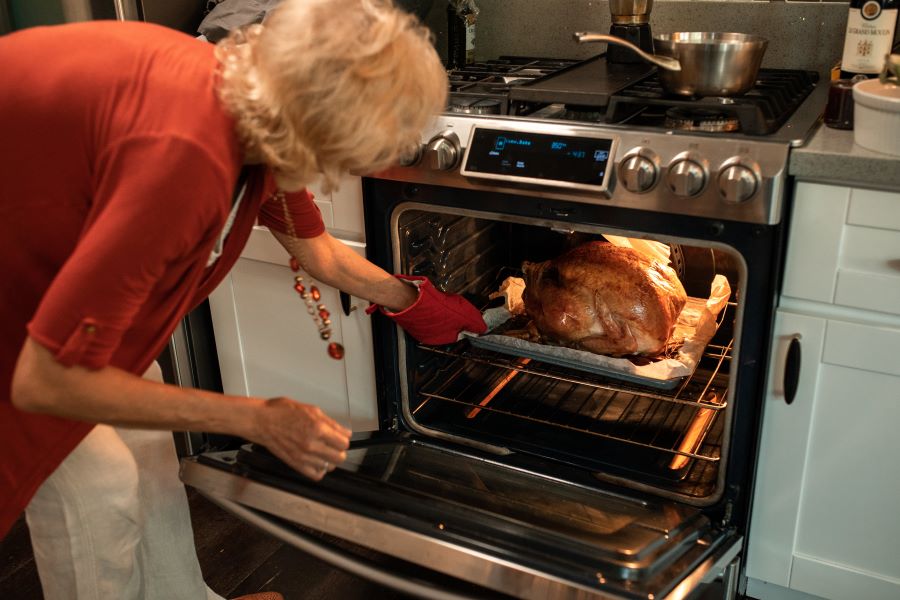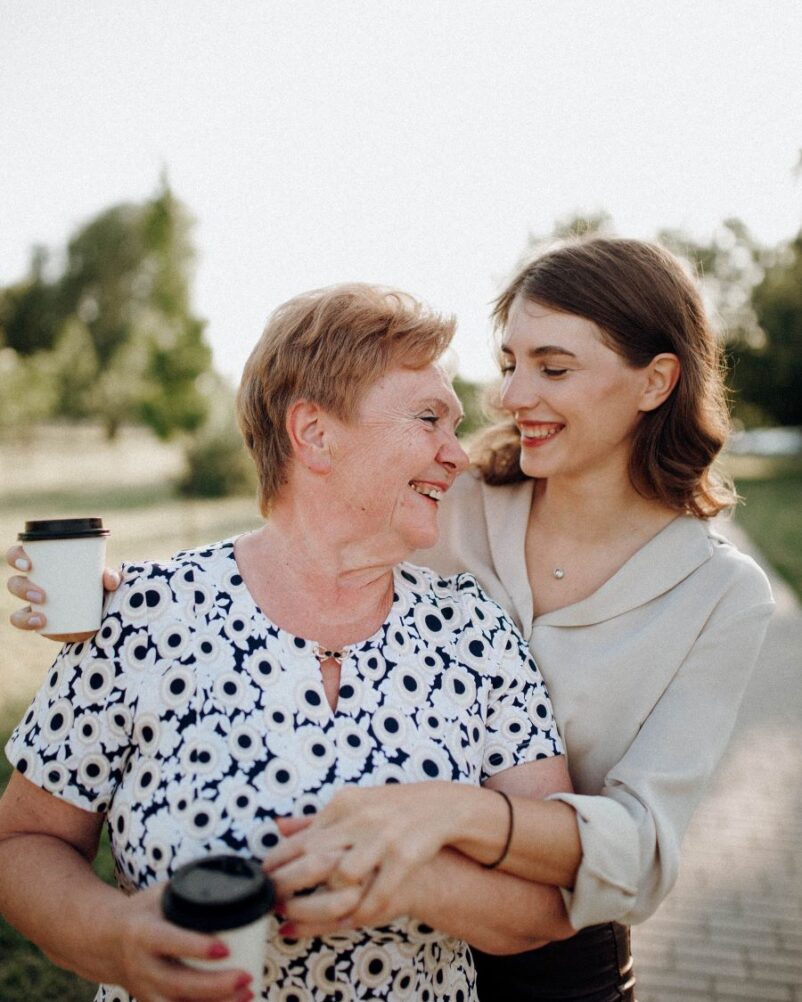
As the holiday season approaches, many of us look forward to festive gatherings, twinkling lights, and heartwarming moments with loved ones.
However, for a significant portion of senior citizens, this time of year can evoke feeling the blues, with bouts of sadness and loneliness. The Senior Citizen Holiday Blues is a phenomenon that often goes unnoticed amidst the hustle and bustle of the season but deserves our attention and empathy.
A loved one may act and even dress the part (like wearing holiday clothes and helping to decorate or bake), but it is apparent that the person is out of sorts and is experiencing the holiday blues.
While people are first taken aback when thinking of the elderly not enjoying the holidays, it just takes a moment of imaging being older – perhaps living alone or in a care facility, surrounded by memories of past celebrations and loved ones who have passed on to understand why many are sad and lonely at this time of the year.
While others are caught up in the excitement of shopping for gifts and planning parties, many seniors face a stark reality: fewer visitors, limited mobility, and a sense of disconnection from the festivities. The result is that they are feeling blue and are sad and lonely.
This blog aims to shed light on these overlooked struggles and explore ways in which we can support our elderly community members during this sad season for many.
I spent a lot of time at a long-term care facility for Alzheimer’s residents and I truly understand how hard it must be, both for the residents there as well as the family and friends who love them. I hope some of these tips can help provide some joy for our beloved individuals who may struggle this time of year.
Why So Many Elderly Individuals Are Feeling the Blues This Year
 The holiday season is often deemed as a time of joy, festivities, and family gatherings. But while society places emphasis on togetherness and merriment during the holidays, seniors who may have lost loved ones or are living alone or are far away from family and friends can experience a deep sense of isolation, and with it sadness and loneliness.
The holiday season is often deemed as a time of joy, festivities, and family gatherings. But while society places emphasis on togetherness and merriment during the holidays, seniors who may have lost loved ones or are living alone or are far away from family and friends can experience a deep sense of isolation, and with it sadness and loneliness.
The bombardment of cheerful advertisements and happy family images can serve as painful reminders of those they have lost or their own lack of companionship.
Moreover, physical limitations and health issues can further compound the holiday blues for seniors. Mobility challenges or chronic illnesses may prevent them from engaging in traditional holiday activities or attending social events, leaving them feeling left out and disconnected from the joy around them.
Not all elderly individuals experience the holidays in the same way, and showing empathy and understanding towards those facing these struggles and who are feeling blue can make a significant difference in their well-being during this time.
Understanding Holiday Depression and SAD in Seniors
Caregivers have often said that dealing with feelings of sadness and loneliness during this time of the year is often one of the hardest tasks they face all year. Understanding holiday depression, or Seasonal Affective Disorder (SAD), in seniors requires recognizing the various factors that can contribute to their emotional struggles during this time.
For some seniors, the holidays may serve as a reminder of lost loved ones or the physical limitations that hinder their ability to participate in festive activities.
Additionally, financial constraints and health issues can exacerbate feelings of sadness and loneliness as well as depression, making it essential for caregivers to provide additional support and empathy during this period.
It’s also important to consider that societal pressures surrounding holiday perfection can be particularly challenging for seniors. The emphasis on family gatherings and elaborate traditions may instill a sense of inadequacy or alienation in those with limited social connections or mobility concerns.
Recognizing these unique stressors and providing opportunities for meaningful engagement and connection can significantly alleviate holiday blues among seniors. By acknowledging their individual experiences and offering compassion, a more inclusive and supportive environment for older adults can be planned during the festive season.
Causes of Feeling the Blues By Seniors During the Winter Months
The causes of holiday blues in senior citizens can be complex and multi-faceted. One significant factor is the sense of loss that many seniors experience during the holidays, as they may be missing loved ones who have passed away or are no longer able to join in the celebrations. This can lead to feeling blue through emotions of sadness and loneliness, especially if their social circle has become smaller over the years.
Another contributing factor is changes in routine and environment, which can disrupt a senior’s sense of stability and comfort. The hustle and bustle of the holiday season, coupled with potential travel or hosting responsibilities, can be overwhelming for seniors who are used to a more relaxed pace and result in what is known as a “sad season” of life.
Additionally, financial concerns and often a loss of independence may add stress to an already emotionally challenging time for some seniors, leading to feelings of anxiety or worry about meeting expectations or satisfying family members’ desires for gifts or lavish experiences.
An important thing to realize when you have a loved one who is feeling blue or seems to be be feeling sad for no reason is that it is a totally normal emotion.
It’s also important to not discount the emotion, as each and every emotion a person feels has significance. It’s important to remember that occasional feelings of being sad and lonely can occur, even if a loved one is still present and family is near.
One effective coping strategy for elderly individuals during this time is to emphasize connections with loved ones, even if it means reaching out virtually. Hosting a virtual family gathering, scheduling video calls with friends, or participating in online social events can help seniors feel more connected and less isolated during the holidays.
If planning this, however, be sure the senior citizen can successfully navigate the technology and knows how to participate in the video call or online connections.
Practicing self-care and setting realistic expectations are also important coping strategies for seniors during the holidays. Encouraging seniors to engage in activities that bring them joy, such as listening to music, reading books, baking, or pursuing hobbies, can help alleviate feelings of sadness and loneliness.
 Additionally, setting realistic expectations around holiday plans and activities can reduce stress and pressure on seniors, allowing them to enjoy the season at their own pace. By implementing these coping strategies, seniors can navigate the holiday “sad season” with a greater sense of purpose and fulfillment.
Additionally, setting realistic expectations around holiday plans and activities can reduce stress and pressure on seniors, allowing them to enjoy the season at their own pace. By implementing these coping strategies, seniors can navigate the holiday “sad season” with a greater sense of purpose and fulfillment.
Ways to Bring Joy and Connection to Seniors Who Are Struggling with Feeling the Blues
One beautiful way to bring joy and connection to seniors who may be struggling with sadness and loneliness is through the power of storytelling. Creating opportunities for them to share their life experiences, memories, and wisdom not only provides them with a sense of validation and importance but also allows younger generations to connect on a deeper level.
This exchange of stories can foster understanding, empathy, and mutual respect between generations, bridging the gap between the old and the young and minimize the emotion of feeling blue.
Another impactful method of feeling blue for no reason is introducing seniors to technology that enables them to stay connected with their loved ones. Whether it’s teaching them how to video call or setting up social media accounts, these digital tools can open up a whole new world of communication for seniors. By helping them navigate this often intimidating terrain, seniors can feel empowered to stay in touch with family and friends near and far, creating meaningful connections that can combat feelings of isolation during the holiday season.
Community involvement can provide a sense of belonging and purpose for seniors who may otherwise feel disconnected from the festivities around them. Whether it’s through local senior centers, neighborhood groups, or religious organizations, community efforts can help create meaningful experiences and alleviate feelings of loneliness. By promoting inclusivity and understanding within our communities, the elderly population can feel valued and supported during what should be a joyous time of year.
Supporting Seniors Through the Holiday Season
Supporting seniors through the holiday season of feeling the blues is a vital way to ensure they feel valued and included. It’s important to recognize that for many seniors, the holidays can be a time of loneliness and isolation, especially if they have lost loved ones or are unable to participate in traditional celebrations.
By reaching out with acts of kindness, such as spending time with them, sending cards or small gifts, or even just making a phone call to check in, we can make a significant difference in their lives and minimize feeling of depression.
 Additionally, the importance of fostering intergenerational connections during this festive season cannot be overstated. Encouraging young people to engage with seniors through simple gestures like listening to their stories or helping them decorate or choose presents can create meaningful bonds that benefit both parties.
Additionally, the importance of fostering intergenerational connections during this festive season cannot be overstated. Encouraging young people to engage with seniors through simple gestures like listening to their stories or helping them decorate or choose presents can create meaningful bonds that benefit both parties.
Through collective efforts and genuine compassion, we can truly support and uplift our senior citizens during what should be a joyous time of year.
RELATED: 7 Best Holiday Safety Tips for Senior Citizens This Season
More on Senior Safety and Healthy Living from Senior Denial
Here are related stories on Healthy Living and taking care of yourself both physically and mentally so you can live a longer, happier life!
- Walking for Mental Health: Strolling Along to Better Wellness
- Debunking 11 Tired Stereotypes and Myths About Aging
- Breaking the Taboo: Speaking Out on Aging and Mental Health
- Life Expectancy: Proving Age is Just A Number
- Is 65 the Magic Number for Being a Senior Citizen?
Written by
Robin McClure
Robin is the author of 7 parenting books and has 3 grown children, 3 spoiled rescue dogs, and a very understanding husband. She holds a bachelor's degree in journalism and a master's degree in communications, and spends her time writing, drinking coffee, and planning the next grand adventure.



